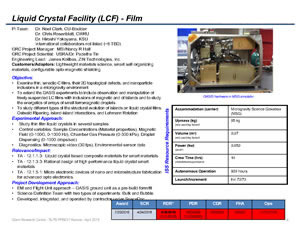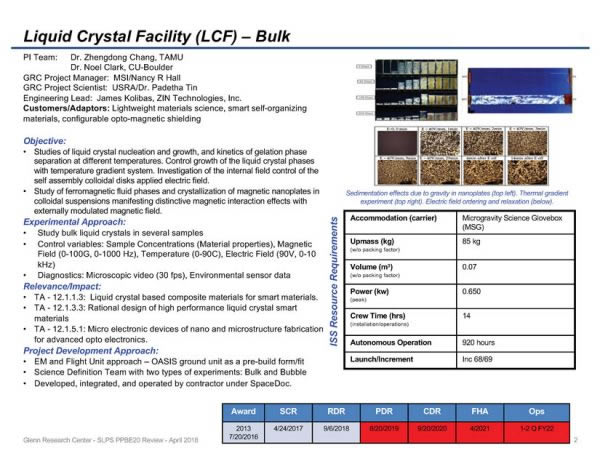Liquid Crystal Facility (LCF)
Liquid Crystal Facility (LCF)
The Liquid Crystal Facility (LCF) enables scientists to explore unique liquid crystal structures and dynamics. Using the International Space Station (ISS) Microgravity Science Glovebox (MSG), the LCF hardware sets conditions for studies of electromagnetic and thermal gradients within bulk, freely suspended thin films in the shape of planar and bubble liquid crystal (LC) materials at microscopic and nanometer length scales. Investigators will use the LCF to study how rays of light pass through or reflect from the liquid crystals to determine how the structures and dynamics are influenced by the various external physical forces such as magnetic field, electric field and temperature in the absence of gravity. The LCF hardware is controlled from Earth by the scientists and engineers from the Telescience Support Center (TSC) and the Principal Investigator (PI) labs. Astronauts help to install, change, troubleshoot, and remove the LCF and all LC sample materials. The LCF is funded by SLPSRA Division as a collaboration between NASA Glenn Research Center (GRC), University Space Research Association (USRA), Texas A&M University, University of Colorado – Boulder, Case Western Reserve University, Kent State University, and ZIN Technologies, Inc.
Anticipated Benefits
Liquid Crystals are a unique phase of matter that is partially solid, partially liquid, and can be controlled or manipulated. On Earth, liquid crystals and similar colloidal materials are in all kinds of visual displays, optical fibers, computer networking equipment, antenna coatings, forehead thermometers, contact lenses, eyewear, smart windows and materials.
In Space, there are many LC properties that have the potential for advancing exploration including lightweight smart materials, opto-electronic shielding, dynamic antennas, dynamic vapor filters, nanoparticle materials, and various films. Our knowledge of liquid crystal properties has been limited to Earth’s gravity-based manufacturing and repair locations. LCF enables deeper understanding of the liquid crystal properties that are often overshadowed by gravity-induced sedimentation, buoyancy driven convective effects and inherently difficult or impossible to study on Earth.
Liquid Crystal Facility (LCF) – Bulk
Objective
- Studies of liquid crystal nucleation and growth, and kinetics of gelation phase separation at different temperatures. Control growth of the liquid crystal phases with temperature gradient system. Investigation of the internal field control of the self assembly colloidal disks applied electric field.
- Study of ferromagnetic fluid phases and crystallization of magnetic nanoplates in colloidal suspensions manifesting distinctive magnetic interaction effects with externally modulated magnetic field.
Contact Information
Liquid Crystal Facility (LCF) – Film
Objective
- Examine thin, smectic – C films, their 2D topological defects, and nanoparticle inclusions in a microgravity environment
- To extend the OASIS experiments to include observation and manipulation of freely suspended LC films with inclusions of magnetic and of islands and to study the energetics of arrays of small ferromagnetic droplets
- To study different types of the structural evolution of islands on liquid crystal films: Ostwald Ripening, island – island Interactions, and Lehmann Rotation


